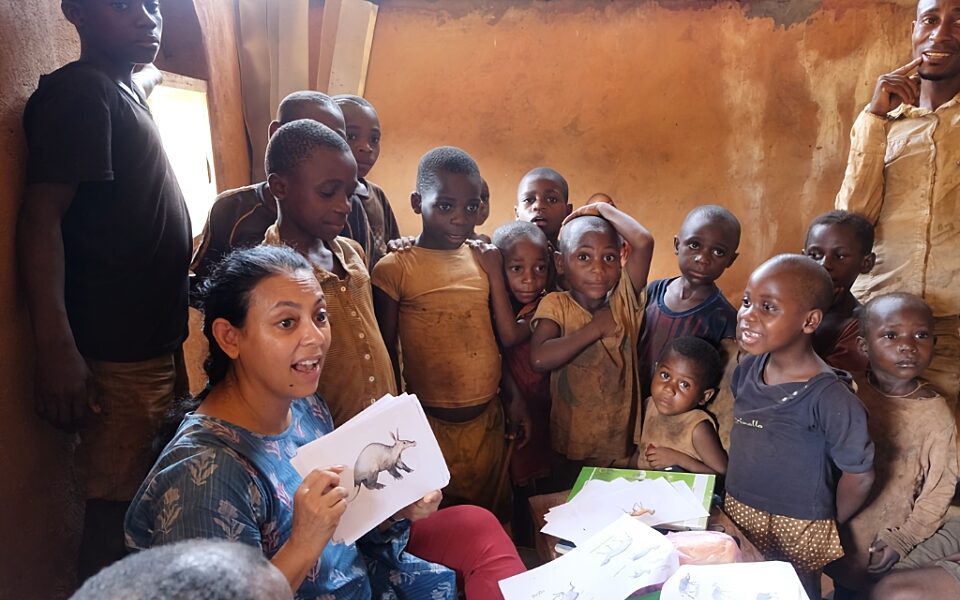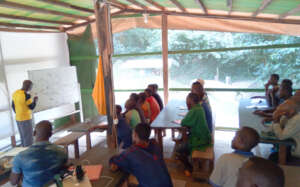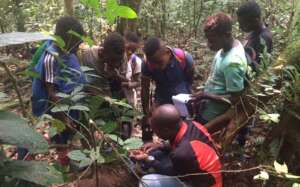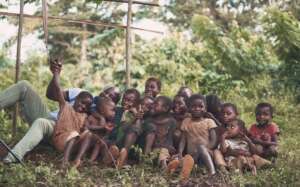
School for Indigenous and Local Knowledge (SILK)
Preserving indigenous and local knowledge of the Congo Basin Rainforest.
Status: Ongoing
Millennia of forest ecology knowledge
The Baka people are traditional hunter gatherers that have lived in the rainforests of central Africa for millennia. They possess a detailed and intimate understanding of the forest, which they traditionally relied upon for food, shelter, and medicine. This knowledge, about the very basics of life and existence, is critical to their way of life, and the richness of their culture reflects the biological diversity of their environment. Their traditional ecological knowledge (TEK) is maintained and transmitted in bè (song and dance), likano (stories), and ma (traditional medicine). A combination of factors have eroded the traditional Baka way of life, and many communities have become sedentary in roadside settlements.
Click here to download a primer about the SILK project.
A collaborative partnership
CBI co-founder Dr. Thomas Smith has collaborated with Baka on ecological projects since the mid 1980’s. In 1993 Smith and colleagues established a long-term project to study seed dispersing animals important to the maintenance of rainforests at the Bouamir research station located near the center of the Dja Biosphere Reserve in southern Cameroon. Senior Baka were hired to assist with the project, and it soon became clear that their knowledge of the forests and animals was essential for the project’s success.
But it was also clear their extraordinary knowledge of the forest was not being passed to younger generations and was rapidly being lost. By hiring young Baka to work on projects with their elders the project over time began to function as a bridge for traditional knowledge, passing elder knowledge to younger Baka.
Now, almost 30 years later, the new generation of Baka retain the knowledge as elders and have gainful employment as researchers on a growing number of projects. The realization by both the Baka community and Smith lead to the collaborative effort to form the School for Indigenous and Local Knowledge (SILK) to keep Baka TEK alive, and ensure it is transmitted to future generations.

The School employs a variety of approaches to facilitate the documentation, transmission, and valuing of TEK, creating a rich and robust learning environment for young Baka:
- Baka-led documentation: Baka youth draw, write, and record elder Baka sharing their knowledge. Youth are trained on basic video techniques, which they use to record Baka elders in situ using traditional hunting and gathering techniques, preparing traditional medicines, and telling “chantfables.” CBI is building basic solar powered computers that the Baka can store and view this documentation on in their community so it is accessible to them.
- Curriculum development: Through a series of dozens of interviews with men and women, SILK Project Director Dr. Ruksan Bose documented key TEK related to food gathering and preparation, cultural practices, and plant and animal identification. She worked with Baka elders to turn the results from the interviews into curriculum that could be used across Baka communities in the region.
- Formal education: CBI hosts multi-day field courses at Bouamir Research Station where Baka elders teach TEK to youth. The courses include many forest walks, where sight, smell, and sound are all used to identify the presence of many species of flora and fauna. These field courses were the first time many Baka children saw gorillas and other primates, and learned their role in the forest ecosystem. In the evenings, traditional stories, songs, and dances are shared.
- Employment: As the Baka are increasingly integrating into the local market economy, CBI has hired Baka to act as guides, collaborators, and researchers on projects. This demonstrates to the Baka youth that there is also economic value in the TEK they are learning, and provides additional learning and practice opportunities. There are also efforts to integrate western science where possible. For example, the Baka working on projects have learned the Latin names for most of the animal and tree species and have also gained experience working with western scientists. This increases their employment opportunities with other scientists and conservationists. In addition, we are working to provide advanced educational opportunities to Baka communities.
- Informal education: The project encourages both elders and youth to take advantage of myriad opportunities for education that occur in unstructured settings. For example, CBI pairs Baka elders and youth to conduct regular floral and faunal surveys, creating additional opportunities for elders to mentor the youth.

Senior Baka researchers now refer to themselves as “Professor of the Forest” (a term they coined) and many are now gainfully employed on research projects, teaching workshops to Baka youth as well as to western scientists.


The next steps: from knowledge transmission to conservation and agency
SILK is an important step to address an acute problem: the loss of vital Baka TEK about the forests of the Congo Basin. It is also a stepping stone for broader conservation and indigenous management objectives.
The Congo Basin rainforest is an extraordinarily diverse ecosystems second only to the Amazon for number of species. It hosts gorillas, chimpanzees, and critically endangered forest elephants, to name just a few. It is also severely threatened by deforestation and climate change. Baka knowledge is essential for finding ways to preserve and manage the ecosystem. Thus, the SILK project is intended to contribute to two larger goals:
- Deepen collaborative research that employs both TEK and Western science to better understand the Congo Basin. This understanding can be translated into improved management and protection of this critical ecosystem.
- Leverage the Baka’s TEK into increased access and agency. SILK creates a foundation for indigenous management of forests. SILK hopes to explore ways that Baka approaches to natural resource management, which proved sustainable over millennia, can be expanded, and Baka can have increased autonomy over their livelihoods.

Baka reflect on the School for Indigenous and Local Knowledge:
“I feel like I added many things to my own knowledge during [a SILK] course. There were many things I myself had forgotten and realized that they were so many things in the forest that are important for us the Baka. Another thing that was important for us in this forest course was that we taught the kids and Mama Roxane [CBI’s SILK Project Director] also taught them and us [Western science] in the evening and we added them together and could learn both these things. So I feel that I can be the most knowledgeable person because I have both types of knowledge, I can have access to both ways of knowing and know more.”
— Gaston
“Our contribution is the knowledge that we give to our children today. That same traditional ecological knowledge can be given to someone from outside who wants to learn and will help the world. We can take you to the forest and share, and those who learn from us will teach others and so on and so forth, to improve the plight of the Baka. Our knowledge and rhythm of life - we want that the Baka man also has this force, this knowledge, we need the world to know. We are losing our culture, our songs and dances, we depend on the SILK project to help us preserve this, and for the children to learn and go further than us.”
—Samuel
The School for Indigenous and Local Knowledge (SILK) is supported by the Arcus Foundation and the Ambassador’s Fund for Cultural Preservation at the U.S. Department of State. The SILK project was initiated thanks to a National Geographic Explorer Grant.